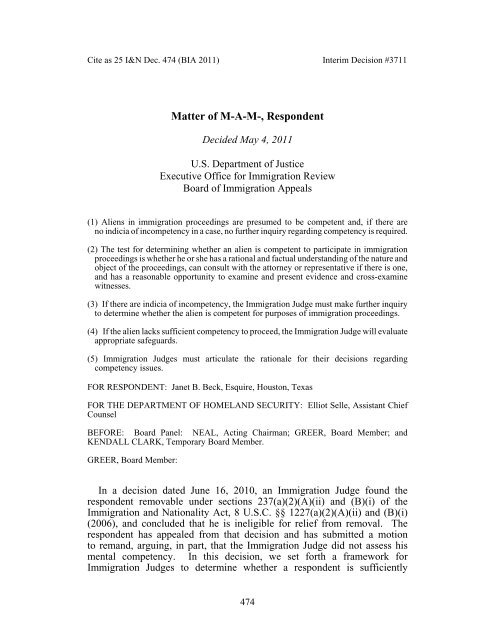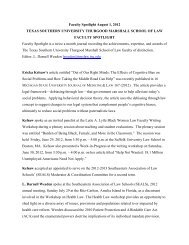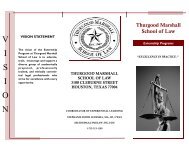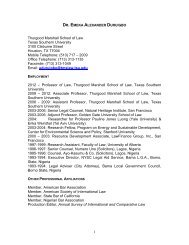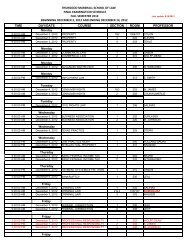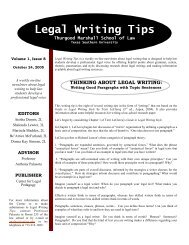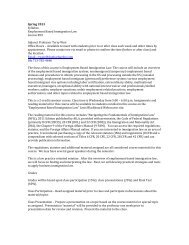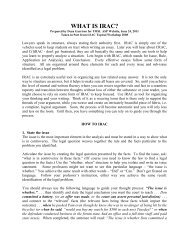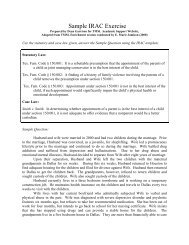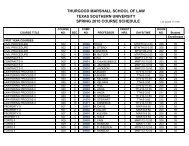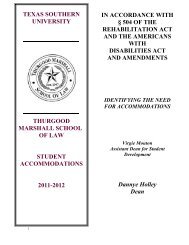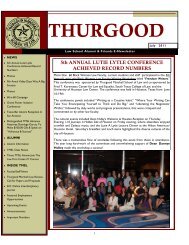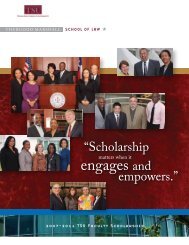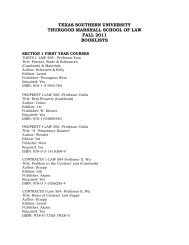Matter of M-A-M-, 25 I & N Dec. 474 (BIA 2011) - Department of Justice
Matter of M-A-M-, 25 I & N Dec. 474 (BIA 2011) - Department of Justice
Matter of M-A-M-, 25 I & N Dec. 474 (BIA 2011) - Department of Justice
Create successful ePaper yourself
Turn your PDF publications into a flip-book with our unique Google optimized e-Paper software.
Cite as <strong>25</strong> I&N <strong>Dec</strong>. <strong>474</strong> (<strong>BIA</strong> <strong>2011</strong>) Interim <strong>Dec</strong>ision #3711<br />
<strong>Matter</strong> <strong>of</strong> M-A-M-, Respondent<br />
<strong>Dec</strong>ided May 4, <strong>2011</strong><br />
U.S. <strong>Department</strong> <strong>of</strong> <strong>Justice</strong><br />
Executive Office for Immigration Review<br />
Board <strong>of</strong> Immigration Appeals<br />
(1) Aliens in immigration proceedings are presumed to be competent and, if there are<br />
no indicia <strong>of</strong> incompetency in a case, no further inquiry regarding competency is required.<br />
(2) The test for determining whether an alien is competent to participate in immigration<br />
proceedings is whether he or she has a rational and factual understanding <strong>of</strong> the nature and<br />
object <strong>of</strong> the proceedings, can consult with the attorney or representative if there is one,<br />
and has a reasonable opportunity to examine and present evidence and cross-examine<br />
witnesses.<br />
(3) If there are indicia <strong>of</strong> incompetency, the Immigration Judge must make further inquiry<br />
to determine whether the alien is competent for purposes <strong>of</strong> immigration proceedings.<br />
(4) If the alien lacks sufficient competency to proceed, the Immigration Judge will evaluate<br />
appropriate safeguards.<br />
(5) Immigration Judges must articulate the rationale for their decisions regarding<br />
competency issues.<br />
FOR RESPONDENT: Janet B. Beck, Esquire, Houston, Texas<br />
FOR THE DEPARTMENT OF HOMELAND SECURITY: Elliot Selle, Assistant Chief<br />
Counsel<br />
BEFORE: Board Panel: NEAL, Acting Chairman; GREER, Board Member; and<br />
KENDALL CLARK, Temporary Board Member.<br />
GREER, Board Member:<br />
In a decision dated June 16, 2010, an Immigration Judge found the<br />
respondent removable under sections 237(a)(2)(A)(ii) and (B)(i) <strong>of</strong> the<br />
Immigration and Nationality Act, 8 U.S.C. §§ 1227(a)(2)(A)(ii) and (B)(i)<br />
(2006), and concluded that he is ineligible for relief from removal. The<br />
respondent has appealed from that decision and has submitted a motion<br />
to remand, arguing, in part, that the Immigration Judge did not assess his<br />
mental competency. In this decision, we set forth a framework for<br />
Immigration Judges to determine whether a respondent is sufficiently<br />
<strong>474</strong>
Cite as <strong>25</strong> I&N <strong>Dec</strong>. <strong>474</strong> (<strong>BIA</strong> <strong>2011</strong>) Interim <strong>Dec</strong>ision #3711<br />
competent to proceed and whether the application <strong>of</strong> safeguards is warranted.<br />
The record will be remanded to the Immigration Judge.<br />
I. FACTUAL AND PROCEDURAL HISTORY<br />
The respondent is a native and citizen <strong>of</strong> Jamaica who was admitted<br />
to the United States as a lawful permanent resident on February 19, 1971,<br />
when he was 10 years old. On July 31, 2008, the <strong>Department</strong> <strong>of</strong> Homeland<br />
Security (“DHS”) served the respondent with a Notice to Appear (Form I-862),<br />
charging that he is removable under section 237(a)(2)(A)(ii) <strong>of</strong> the Act on the<br />
basis <strong>of</strong> his conviction for two or more crimes involving moral turpitude. The<br />
DHS subsequently amended the allegations and lodged additional charges,<br />
charging the respondent with removability under section 237(a)(2)(B)(i) <strong>of</strong> the<br />
Act, as an alien convicted <strong>of</strong> a controlled substance violation, and under<br />
section 237(a)(2)(A)(iii), as an alien convicted <strong>of</strong> a drug-trafficking aggravated<br />
felony pursuant to section 101(a)(43)(B) <strong>of</strong> the Act, 8 U.S.C. § 1101(a)(43)(B)<br />
(2006).<br />
When the respondent first appeared before an Immigration Judge for<br />
a master calendar hearing on September 14, 2009, he had difficulty answering<br />
basic questions, such as his name and date <strong>of</strong> birth, and he told the<br />
Immigration Judge that he had been diagnosed with schizophrenia. He also<br />
indicated that he needed medication. At the second hearing, on October 21,<br />
2009, the respondent indicated that he had a history <strong>of</strong> mental illness that was<br />
not being treated in detention. The respondent requested a change <strong>of</strong> venue<br />
to be closer to his attorney and family, but the request was denied. Additional<br />
hearings were held on November 4, 2009, <strong>Dec</strong>ember 7, 2009, January <strong>25</strong>,<br />
2010, and April 1, 2010. During those hearings, further reference was made<br />
to the respondent’s mental illness and he asked to see a psychiatrist.<br />
On June 16, 2010, a different Immigration Judge convened the final merits<br />
hearing. At that time, psychiatric evaluations and reports about the respondent<br />
from New York State’s Office <strong>of</strong> Mental Health were included in the record.<br />
The Immigration Judge asked the respondent about his mental health and<br />
treatment. Specifically, the Immigration Judge asked the respondent whether<br />
he was able to proceed with the hearing, and the respondent answered that<br />
he would do the best he could.<br />
Initially, the respondent indicated that he could not represent himself but,<br />
upon further questioning by the Immigration Judge, said he “believed” that he<br />
could answer the questions put to him by the Immigration Judge and the DHS<br />
attorney. The Immigration Judge proceeded with the merits hearing, asking<br />
the respondent questions about his entry into the United States, his criminal<br />
convictions, and his fear <strong>of</strong> returning to Jamaica. Throughout the proceedings,<br />
the respondent appeared pro se.<br />
475
Cite as <strong>25</strong> I&N <strong>Dec</strong>. <strong>474</strong> (<strong>BIA</strong> <strong>2011</strong>) Interim <strong>Dec</strong>ision #3711<br />
In her decision, the Immigration Judge summarized the respondent’s mental<br />
health history but did not make an explicit finding regarding his mental<br />
competency. The Immigration Judge found the respondent removable on the<br />
charges relating to his convictions for crimes involving moral turpitude and<br />
controlled substance violations, but not on the aggravated felony charge. The<br />
Immigration Judge denied the respondent’s application for cancellation<br />
<strong>of</strong> removal under section 240A(a) <strong>of</strong> the Act, 8 U.S.C. § 1229b(a) (2006),<br />
in the exercise <strong>of</strong> discretion. She also denied his applications for asylum and<br />
withholding <strong>of</strong> removal because the respondent did not establish a nexus<br />
or harm that was sufficiently severe to constitute persecution. The<br />
Immigration Judge also found the respondent ineligible for protection under<br />
the Convention Against Torture, and Other Cruel, Inhuman or Degrading<br />
Treatment or Punishment, adopted and opened for signature <strong>Dec</strong>. 10, 1984,<br />
G.A. Res. 39/46. 39 U.N. GAOR Supp. No. 51, at 197, U.N. Doc.<br />
A/RES/39/708 (1984) (entered into force June 26, 1987; for the United States<br />
Apr. 18, 1988).<br />
The respondent, now represented, has appealed from the Immigration<br />
Judge’s decision and challenges the decision on the merits. The respondent<br />
has also submitted a motion to remand arguing, in part, that the Immigration<br />
Judge failed to properly assess his mental competency.<br />
II. ISSUES<br />
This case presents three questions related to mental competency<br />
determinations: (1) When should Immigration Judges make competency<br />
determinations? (2) What factors should Immigration Judges consider and<br />
what procedures should they employ to make those determinations? (3) What<br />
safeguards should Immigration Judges prescribe to ensure that proceedings are<br />
sufficiently fair when competency is not established?<br />
III. ANALYSIS<br />
We recognize that this is a difficult area <strong>of</strong> the law and that our decision<br />
today addresses a limited set <strong>of</strong> questions regarding aliens with competency<br />
issues in immigration proceedings. Nevertheless, our goal is to ensure that<br />
proceedings are as fair as possible in an unavoidably imperfect situation.<br />
To that end, this decision will provide a framework for analyzing cases<br />
in which issues <strong>of</strong> mental competency are raised. 1<br />
1<br />
Our analysis is largely consistent with agency practice as reflected<br />
in the Immigration Judge Benchbook. Immigration Judge Benchbook, Introductory Guides,<br />
Mental Health Issues, http://www.justice.gov/eoir/vll/benchbook/tools/MHI/.<br />
476
Cite as <strong>25</strong> I&N <strong>Dec</strong>. <strong>474</strong> (<strong>BIA</strong> <strong>2011</strong>) Interim <strong>Dec</strong>ision #3711<br />
A. Presumption <strong>of</strong> Competency<br />
As a threshold matter, we find that an alien is presumed to be competent<br />
to participate in removal proceedings. See, e.g., Munoz-Monsalve v. Mukasey,<br />
551 F.3d 1, 6 (1st Cir. 2008) (finding that it is the alien’s burden to first<br />
raise the issue <strong>of</strong> competency); cf. United States v. Shan Wei Yu, 484 F.3d 979,<br />
985 (8th Cir. 2007) (stating that in a criminal proceeding, competency<br />
is “presumed ‘absent some contrary indication’ arising from irrational<br />
behavior, the defendant’s demeanor, and any prior medical opinions<br />
addressing the defendant’s competency” (quoting United States v. Long Crow,<br />
37 F.3d 1319, 13<strong>25</strong> (8th Cir. 1994))). See generally Valenzuela-Solari<br />
v. Mukasey, 551 F.3d 53, 57 (1st Cir. 2008) (finding that if there is a claim<br />
<strong>of</strong> language disability, the alien must ordinarily raise it first in the agency<br />
proceedings).<br />
Absent indicia <strong>of</strong> mental incompetency, an Immigration Judge is under<br />
no obligation to analyze an alien’s competency. Munoz-Monsalve v. Mukasey,<br />
551 F.3d at 6 (finding that an Immigration Judge’s failure to sua sponte order<br />
a competency evaluation did not violate the alien’s due process rights where<br />
he was represented, his attorney did not request an evaluation, and the record<br />
did not contain evidence <strong>of</strong> a lack <strong>of</strong> competency); Nelson v. INS, 232 F.3d<br />
<strong>25</strong>8, 261-62 (1st Cir. 2000) (finding that health-related complaints such<br />
as headache and poor memory do not rise to the level <strong>of</strong> mental<br />
incompetency).<br />
The Act and the regulations contemplate circumstances in which<br />
competency concerns trigger the application <strong>of</strong> appropriate safeguards.<br />
We will examine the governing statutory and regulatory authority,<br />
as interpreted by case law, to address the issues presented.<br />
B. Legal Authority<br />
1. Statutory and Regulatory Provisions<br />
The Act acknowledges that aliens in proceedings may be mentally<br />
incompetent. Specifically, the Act provides as follows:<br />
If it is impracticable by reason <strong>of</strong> an alien’s mental incompetency for the alien<br />
to be present at the proceeding, the Attorney General shall prescribe safeguards<br />
to protect the rights and privileges <strong>of</strong> the alien.<br />
Section 240(b)(3) <strong>of</strong> the Act, 8 U.S.C. § 1229a(b)(3) (2006). The Act’s<br />
invocation <strong>of</strong> safeguards presumes that proceedings can go forward, even<br />
where the alien is incompetent, provided the proceeding is conducted fairly.<br />
477
Cite as <strong>25</strong> I&N <strong>Dec</strong>. <strong>474</strong> (<strong>BIA</strong> <strong>2011</strong>) Interim <strong>Dec</strong>ision #3711<br />
The regulations provide guidance regarding the treatment <strong>of</strong> aliens who<br />
lack mental competency. An incompetent alien must be served with the<br />
Notice to Appear in person. 8 C.F.R. § 103.5a(c)(2) (2010). If the alien is<br />
confined in a penal or mental institution or hospital, service generally must be<br />
made on the alien, as well as the person in charge <strong>of</strong> the institution, although<br />
if the alien is incompetent, service can only be made on the person in charge<br />
<strong>of</strong> the institution where the alien is confined. 8 C.F.R. § 103.5a(c)(2)(i). If the<br />
alien is not confined, service must be made on the person with whom the alien<br />
resides. 8 C.F.R. § 103.5a(c)(2)(ii). Further, “whenever possible, service shall<br />
also be made on the near relative, guardian, committee, or friend.” Id.<br />
Additional requirements are prescribed in the regulations to ensure that<br />
an incompetent alien is afforded an adequate opportunity to present his or her<br />
case during a hearing. Immigration Judges may not accept an admission<br />
<strong>of</strong> removability from an unrepresented respondent who is incompetent and<br />
unaccompanied. 8 C.F.R. § 1240.10(c) (2010). When it is impracticable for<br />
the respondent to be present at the hearing because <strong>of</strong> mental incompetency,<br />
the attorney, legal representative or guardian, near relative, or friend who was<br />
served with a copy <strong>of</strong> the Notice to Appear is permitted to appear on behalf<br />
<strong>of</strong> the respondent. 8 C.F.R. §§ 1240.4, 1240.43 (2010). If such a person<br />
cannot be found or fails or refuses to appear, the regulations provide that the<br />
“custodian <strong>of</strong> the respondent shall be requested to appear on behalf <strong>of</strong> the<br />
respondent.” Id.<br />
If an Immigration Judge determines that a respondent lacks sufficient<br />
competency to proceed with the hearing, the Immigration Judge will evaluate<br />
which available measures would result in a fair hearing. Immigration Judges<br />
“shall prescribe safeguards to protect the rights and privileges <strong>of</strong> the alien.”<br />
Section 240(b)(3) <strong>of</strong> the Act; see also 8 C.F.R. § 1003.10(b) (2010).<br />
Although the Act and the regulations provide direction for handling cases<br />
in which competency is an issue, they do not set forth the process that<br />
an Immigration Judge should use to assess the competency <strong>of</strong> an alien<br />
appearing in Immigration Court. This decision sets out a framework for that<br />
purpose.<br />
2. Competency for Purposes <strong>of</strong> Immigration Proceedings<br />
Although immigration proceedings are civil in nature, the law regarding<br />
mental competency issues in criminal proceedings is well developed, and<br />
we consider it instructive. The United States Supreme Court has held in the<br />
criminal context that a person is not competent to stand trial if “he lacks the<br />
capacity to understand the nature and object <strong>of</strong> the proceedings against him,<br />
to consult with counsel, and to assist in preparing his defense.” Drope<br />
v. Missouri, 420 U.S. 162, 171 (1975).<br />
478
Cite as <strong>25</strong> I&N <strong>Dec</strong>. <strong>474</strong> (<strong>BIA</strong> <strong>2011</strong>) Interim <strong>Dec</strong>ision #3711<br />
Unlike in criminal proceedings, a lack <strong>of</strong> competency in civil immigration<br />
proceedings does not mean that the hearing cannot go forward; rather,<br />
procedural fairness is required. In immigration proceedings, the Fifth<br />
Amendment entitles aliens to due process <strong>of</strong> law. Reno v. Flores, 507 U.S.<br />
292, 306 (1993). Included in the rights that the Due Process Clause requires<br />
in removal proceedings is the right to a full and fair hearing. <strong>Matter</strong> <strong>of</strong> M-D-,<br />
23 I&N <strong>Dec</strong>. 540, 542 (<strong>BIA</strong> 2002) (citing Landon v. Plasencia, 459 U.S. 21,<br />
32-33 (1982)). “A removal hearing must be conducted in a manner that<br />
satisfies principles <strong>of</strong> fundamental fairness.” <strong>Matter</strong> <strong>of</strong> Beckford, 22 I&N <strong>Dec</strong>.<br />
1216, 12<strong>25</strong> (<strong>BIA</strong> 2000); see also Shaughnessey v. United States ex rel. Mezei,<br />
345 U.S. 206, 212 (1953) (stating that immigration proceedings must conform<br />
to traditional standards <strong>of</strong> fairness encompassed in due process).<br />
To meet traditional standards <strong>of</strong> fundamental fairness in determining<br />
whether an alien is competent to participate in immigration proceedings,<br />
Immigration Judges must accord aliens the specific “rights and privileges”<br />
prescribed in the Act. Section 240(b)(3) <strong>of</strong> the Act. For example, aliens “shall<br />
have the privilege <strong>of</strong> being represented” at no expense to the Government.<br />
Sections 240(b)(4)(A), 292 <strong>of</strong> the Act, 8 U.S.C. §§ 1229a(b)(4)(A), 1362<br />
(2006). In addition, the Act requires that an alien have a “reasonable<br />
opportunity” to examine and present evidence and to cross-examine witnesses.<br />
Section 240(b)(4)(B) <strong>of</strong> the Act; see also 8 C.F.R. § 1240.10(a)(4). Therefore,<br />
the test for determining whether an alien is competent to participate<br />
in immigration proceedings is whether he or she has a rational and factual<br />
understanding <strong>of</strong> the nature and object <strong>of</strong> the proceedings, can consult with the<br />
attorney or representative if there is one, and has a reasonable opportunity<br />
to examine and present evidence and cross-examine witnesses.<br />
C. Framework for Cases Presenting Competency Issues<br />
1. Indicia <strong>of</strong> Incompetency<br />
In cases involving aliens with issues <strong>of</strong> mental competency, Immigration<br />
Judges will need to consider whether there is good cause to believe that the<br />
alien lacks sufficient competency to proceed without safeguards. Indicia<br />
<strong>of</strong> incompetency include a wide variety <strong>of</strong> observations and evidence. For<br />
example, the Immigration Judge or the parties may observe certain behaviors<br />
by the respondent, such as the inability to understand and respond to questions,<br />
the inability to stay on topic, or a high level <strong>of</strong> distraction. Second, the record<br />
may contain evidence <strong>of</strong> mental illness or incompetency. This could include<br />
direct assessments <strong>of</strong> the respondent’s mental health, such as medical reports<br />
or assessments from past medical treatment or from criminal proceedings,<br />
as well as testimony from medical health pr<strong>of</strong>essionals. It may also include<br />
evidence from other relevant sources, such as school records regarding special<br />
479
Cite as <strong>25</strong> I&N <strong>Dec</strong>. <strong>474</strong> (<strong>BIA</strong> <strong>2011</strong>) Interim <strong>Dec</strong>ision #3711<br />
education classes or individualized education plans; reports or letters from<br />
teachers, counselors, or social workers; evidence <strong>of</strong> participation in programs<br />
for persons with mental illness; evidence <strong>of</strong> applications for disability benefits;<br />
and affidavits or testimony from friends or family members.<br />
The DHS will <strong>of</strong>ten be in possession <strong>of</strong> relevant evidence, particularly<br />
where the alien is detained. The DHS has an obligation to provide the court<br />
with relevant materials in its possession that would inform the court about the<br />
respondent’s mental competency. 8 C.F.R. § 1240.2(a) (2010) (“[DHS]<br />
counsel shall present on behalf <strong>of</strong> the government evidence material to the<br />
issues <strong>of</strong> deportability or inadmissibility and any other issues that may require<br />
disposition by the immigration judge.”); see also <strong>Matter</strong> <strong>of</strong> S-M-J-, 21 I&N<br />
<strong>Dec</strong>. 722, 726-27 (<strong>BIA</strong> 1997) (discussing generally the DHS’s role<br />
in introducing evidence), disapproved <strong>of</strong> on other grounds, Ladha v. INS,<br />
215 F.3d 889 (9th Cir. 2000).<br />
Mental competency is not a static condition. “It varies in degree. It can<br />
vary over time. It interferes with an individual’s functioning at different<br />
times in different ways.” Indiana v. Edwards, 554 U.S. 164, 175 (2008).<br />
As a result, Immigration Judges need to consider indicia <strong>of</strong> incompetency<br />
throughout the course <strong>of</strong> proceedings to determine whether an alien’s<br />
condition has deteriorated or, on the other hand, whether competency has been<br />
restored.<br />
Even if an alien has been deemed to be medically competent, there may<br />
be cases in which an Immigration Judge has good cause for concern about the<br />
ability to proceed, such as where the respondent has a long history <strong>of</strong> mental<br />
illness, has an acute illness, or was restored to competency, but there is reason<br />
to believe that the condition has changed. In such cases, Immigration Judges<br />
should apply appropriate safeguards.<br />
On the other hand, we also recognize that there are many types <strong>of</strong> mental<br />
illness that, even though serious, would not prevent a respondent from<br />
meaningfully participating in immigration proceedings. In other words,<br />
a diagnosis <strong>of</strong> mental illness does not automatically equate to a lack<br />
<strong>of</strong> competency.<br />
2. Measures To Assess Competency<br />
When there are indicia <strong>of</strong> incompetency, an Immigration Judge must take<br />
measures to determine whether a respondent is competent to participate<br />
in proceedings. The approach taken in any particular case will vary based<br />
on the circumstances <strong>of</strong> the case.<br />
For instance, an Immigration Judge may modify the questions posed to the<br />
respondent to make them very simple and direct. The inquiries made should<br />
include questions about where the hearing is taking place, the nature<br />
<strong>of</strong> the proceedings, and the respondent’s state <strong>of</strong> mind. In addition, an<br />
480
Cite as <strong>25</strong> I&N <strong>Dec</strong>. <strong>474</strong> (<strong>BIA</strong> <strong>2011</strong>) Interim <strong>Dec</strong>ision #3711<br />
Immigration Judge might ask the respondent whether he or she currently takes<br />
or has taken medication to treat a mental illness and what the purpose and<br />
effects <strong>of</strong> that medication are. Proceedings may also be continued to allow the<br />
parties to gather and submit evidence relevant to these matters, such as medical<br />
treatment reports, documentation from criminal proceedings, or letters and<br />
testimony from other third party sources that bear on the respondent’s mental<br />
health.<br />
Another measure available to Immigration Judges is a mental competency<br />
evaluation. See, e.g., <strong>Matter</strong> <strong>of</strong> J-F-F-, 23 I&N <strong>Dec</strong>. 912, 915 (A.G. 2006)<br />
(noting that at the Immigration Judge’s request, the DHS arranged for<br />
a psychiatric evaluation <strong>of</strong> a detained alien, which led the psychiatrist<br />
to conclude that the alien understood the proceedings and wanted to proceed<br />
with the hearing). Immigration Judges can also permit a family member<br />
or close friend to assist the respondent in providing information. In addition,<br />
Immigration Judges can docket or manage the case to facilitate the<br />
respondent’s ability to obtain medical treatment and/or legal representation.<br />
For example, a continuance or motion to change venue may be granted<br />
to enable a respondent to be closer to family or available treatment programs.<br />
Immigration Judges can continue proceedings to allow for further evaluation<br />
<strong>of</strong> competency or an assessment <strong>of</strong> changes in the respondent’s condition.<br />
The Immigration Judge must weigh the results from the measures taken and<br />
determine, under the test for competency set out above, whether the respondent<br />
is sufficiently competent to proceed with the hearing without safeguards. Cf.<br />
<strong>Matter</strong> <strong>of</strong> Sinclitico, 15 I&N <strong>Dec</strong>. 320 (<strong>BIA</strong> 1975) (finding that the respondent<br />
was not sufficiently competent to voluntarily relinquish his citizenship where<br />
he did not seem to understand the questions asked <strong>of</strong> him, his answers<br />
to questions were not responsive, there was medical evidence <strong>of</strong> mental illness,<br />
and the respondent’s brother testified regarding his mental illness). The<br />
Immigration Judge must also articulate that determination and his or her<br />
reasoning.<br />
3. Safeguards<br />
If an Immigration Judge determines that a respondent lacks sufficient<br />
competency to proceed with the hearing, the statute provides that the<br />
Immigration Judge “shall prescribe safeguards to protect the rights and<br />
privileges <strong>of</strong> the alien.” Section 240(b)(3) <strong>of</strong> the Act. Based on the statutory<br />
and regulatory parameters, we conclude that Immigration Judges have<br />
481
Cite as <strong>25</strong> I&N <strong>Dec</strong>. <strong>474</strong> (<strong>BIA</strong> <strong>2011</strong>) Interim <strong>Dec</strong>ision #3711<br />
discretion to determine which safeguards are appropriate, given the particular<br />
circumstances in a case before them. 2<br />
As noted above, the regulations provide guidance regarding safeguards<br />
to protect aliens who otherwise lack sufficient competency to meaningfully<br />
participate in proceedings. For example, the regulations prohibit Immigration<br />
Judges from accepting an admission <strong>of</strong> removability from an unrepresented<br />
alien who is incompetent and provide that when an alien is mentally<br />
incompetent, the attorney, near relative, or friend who was served with a copy<br />
<strong>of</strong> the Notice to Appear is permitted to appear on the respondent’s behalf.<br />
8 C.F.R. §§ 1240.4, 1240.10(c), 1240.43. If such a person cannot be found<br />
or fails or refuses to appear, the regulations provide that the respondent’s<br />
custodian “shall be requested to appear on behalf <strong>of</strong> the respondent.” 8 C.F.R.<br />
§§ 1240.4, 1240.43.<br />
Case law also provides guidance to Immigration Judges for determining<br />
how they may fairly proceed when an alien lacks competency. We have held<br />
that an alien’s due process rights were not violated in a deportation hearing<br />
where he was represented by an attorney who was able to introduce evidence<br />
and cross-examine witnesses, a doctor testified regarding his medical<br />
condition, and the respondent appeared to testify intelligently and rationally.<br />
<strong>Matter</strong> <strong>of</strong> H-, 6 I&N <strong>Dec</strong>. 358 (<strong>BIA</strong> 1954). In addition, the Attorney General<br />
has stated that “[i]t is appropriate for Immigration Judges to aid in the<br />
development <strong>of</strong> the record, and directly question witnesses.” <strong>Matter</strong> <strong>of</strong> J-F-F-,<br />
23 I&N <strong>Dec</strong>. at 922; see also section 240(b)(1) <strong>of</strong> the Act (providing that<br />
Immigration Judges shall “interrogate, examine, and cross-examine the alien<br />
and any witnesses”); 8 C.F.R. § 1240.11(a)(2) (2010) (“The immigration judge<br />
shall inform the alien <strong>of</strong> his or her apparent eligibility to apply for any <strong>of</strong> the<br />
benefits enumerated in this chapter and shall afford the alien an opportunity<br />
to make application during the hearing.”).<br />
Several Federal circuit courts have also considered the fairness<br />
<strong>of</strong> proceedings involving aliens with indicia <strong>of</strong> mental incompetency. For<br />
example, the United States Court <strong>of</strong> Appeals for the Ninth Circuit held that<br />
the due process rights <strong>of</strong> an alien with a mental illness were not violated<br />
where he was represented by counsel and was accompanied by a State<br />
court-appointed conservator who testified fully on his behalf. Nee Hao Wong<br />
v. INS, 550 F.2d 521, 523 (9th Cir. 1977). Similarly, the Tenth Circuit<br />
concluded that procedural safeguards were in place and the alien had<br />
2<br />
Immigration Judges already alter or tailor the conduct <strong>of</strong> hearings in response<br />
to a respondent’s limited capacity, such as in proceedings involving unaccompanied<br />
minors. See Operating Policies and Procedures Memorandum 07-01: Guidelines for<br />
Immigration Court Cases Involving Unaccompanied Alien Children (May 22, 2007),<br />
http://www.justice.gov/eoir/efoia/ocij/oppm07/07-01.pdf.<br />
482
Cite as <strong>25</strong> I&N <strong>Dec</strong>. <strong>474</strong> (<strong>BIA</strong> <strong>2011</strong>) Interim <strong>Dec</strong>ision #3711<br />
an opportunity to be heard at a meaningful time and in a meaningful manner<br />
where the alien was represented and was able to answer the questions posed<br />
to him and provide his version <strong>of</strong> the facts. Brue v. Gonzales, 464 F.3d 1227,<br />
1232-34 (10th Cir. 2006). The Eighth Circuit also held that an Immigration<br />
Judge was not required to determine competency where the respondent<br />
answered the charges against him, testified in support <strong>of</strong> his claim for<br />
withholding <strong>of</strong> removal, arranged for two witnesses to appear on his behalf,<br />
was aware <strong>of</strong> the nature and object <strong>of</strong> the proceedings, and vigorously resisted<br />
removal. Mohamed v. Gonzales, 477 F.3d 522, 526-27 (8th Cir. 2007).<br />
In addition, the First Circuit concluded that an alien’s due process rights were<br />
not violated where he was represented, his attorney does not request<br />
an evaluation, and the record did not contain evidence <strong>of</strong> a lack <strong>of</strong> competency.<br />
Munoz-Monsalve v. Mukasey, 551 F.3d at 6-8.<br />
Drawing guidance from the regulations and legal precedent, we note that<br />
there are a number <strong>of</strong> safeguards available to Immigration Judges, some<br />
<strong>of</strong> which they may have already taken when initially assessing the<br />
respondent’s competency. Examples <strong>of</strong> appropriate safeguards include, but are<br />
not limited to, refusal to accept an admission <strong>of</strong> removability from an<br />
unrepresented respondent; identification and appearance <strong>of</strong> a family member<br />
or close friend who can assist the respondent and provide the court with<br />
information; docketing or managing the case to facilitate the respondent’s<br />
ability to obtain legal representation and/or medical treatment in an effort to<br />
restore competency; participation <strong>of</strong> a guardian in the proceedings;<br />
continuance <strong>of</strong> the case for good cause shown; closing the hearing to the<br />
public; waiving the respondent’s appearance; actively aiding in the<br />
development <strong>of</strong> the record, including the examination and cross-examination<br />
<strong>of</strong> witnesses; and reserving appeal rights for the respondent. The Immigration<br />
Judge will consider the facts and circumstances <strong>of</strong> an alien’s case to decide<br />
which <strong>of</strong> these or other relevant safeguards to utilize. The Immigration Judge<br />
must articulate his or her reasoning for the decision.<br />
In some cases, even where the court and the parties undertake their best<br />
efforts to ensure appropriate safeguards, concerns may remain. In these cases,<br />
the Immigration Judge may pursue alternatives with the parties, such<br />
as administrative closure, while other options are explored, such as seeking<br />
treatment for the respondent. 3<br />
3<br />
We recognize that the Act provides that certain aliens with mental illness are<br />
inadmissible under section 212(a)(1)(A)(iii) <strong>of</strong> the Act, 8 U.S.C. § 1182(a)(1)(A)(iii) (2006),<br />
or removable under section 237(a)(1)(A) for having been inadmissible at the time <strong>of</strong> entry<br />
or at the time <strong>of</strong> adjustment <strong>of</strong> status. Proceedings involving inadmissibility under those<br />
sections present a different legal scenario, which is not addressed in this decision.<br />
483
Cite as <strong>25</strong> I&N <strong>Dec</strong>. <strong>474</strong> (<strong>BIA</strong> <strong>2011</strong>) Interim <strong>Dec</strong>ision #3711<br />
D. Summary <strong>of</strong> Legal Framework<br />
To summarize, if there are no indicia <strong>of</strong> incompetency in an alien’s case,<br />
no further inquiry regarding competency is required. The test for determining<br />
whether an alien is competent to participate in immigration proceedings<br />
is whether he or she has a rational and factual understanding <strong>of</strong> the nature and<br />
object <strong>of</strong> the proceedings, can consult with the attorney or representative<br />
if there is one, and has a reasonable opportunity to examine and present<br />
evidence and cross-examine witnesses. If there are indicia <strong>of</strong> incompetency,<br />
the Immigration Judge must make further inquiry to determine whether the<br />
alien is competent for purposes <strong>of</strong> immigration proceedings. If the alien lacks<br />
sufficient competency to proceed, the Immigration Judge will evaluate and<br />
apply appropriate safeguards. The Immigration Judge must articulate the<br />
rationale for his or her decision.<br />
IV. CONCLUSION<br />
In this case, there is good cause to believe that the respondent lacked<br />
sufficient competency to proceed with the hearing. The record includes<br />
several psychiatric reports that diagnose him with mental illness, and during<br />
criminal proceedings, the respondent was found to be unfit to proceed with<br />
a trial. Additionally, before the Immigration Judge, the respondent had<br />
difficulty answering questions, discussed his illness and need for medication,<br />
and asked to see a psychiatrist.<br />
Given these circumstances, we will remand the record to the Immigration<br />
Judge to apply the framework articulated here. On remand, the Immigration<br />
Judge should take steps to assess the respondent’s competency, make a finding<br />
regarding his competency, apply safeguards as warranted, and articulate her<br />
reasoning. The parties will have an opportunity on remand to present evidence<br />
relevant to an evaluation <strong>of</strong> the respondent’s competency and any other<br />
appropriate issues.<br />
ORDER: The record is remanded to the Immigration Judge for further<br />
proceedings consistent with the foregoing opinion and for the entry <strong>of</strong> a new<br />
decision.<br />
484


